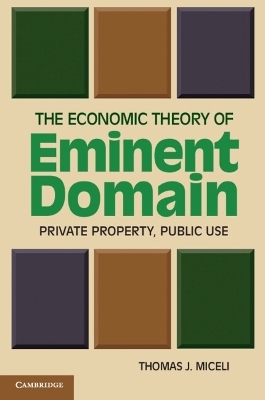
The Economic Theory of Eminent Domain
Private Property, Public Use
Seiten
2011
Cambridge University Press (Verlag)
978-0-521-18297-3 (ISBN)
Cambridge University Press (Verlag)
978-0-521-18297-3 (ISBN)
This book uses economic theory to examine the proper scope of the government's constitutional power of eminent domain, which entitles it to take private property for public use, provided that it pays the owner just compensation.
Surveys the contributions that economic theory has made to the often contentious debate over the government's use of its power of eminent domain, as prescribed by the Fifth Amendment. It addresses such questions as: when should the government be allowed to take private property without the owner's consent? Does it depend on how the land will be used? Also, what amount of compensation is the landowner entitled to receive (if any)? The recent case of Kelo v. New London (2005) revitalized the debate, but it was only the latest skirmish in the ongoing struggle between advocates of strong governmental powers to acquire private property in the public interest and private property rights advocates. Written for a general audience, the book advances a coherent theory that views eminent domain within the context of the government's proper role in an economic system whose primary objective is to achieve efficient land use.
Surveys the contributions that economic theory has made to the often contentious debate over the government's use of its power of eminent domain, as prescribed by the Fifth Amendment. It addresses such questions as: when should the government be allowed to take private property without the owner's consent? Does it depend on how the land will be used? Also, what amount of compensation is the landowner entitled to receive (if any)? The recent case of Kelo v. New London (2005) revitalized the debate, but it was only the latest skirmish in the ongoing struggle between advocates of strong governmental powers to acquire private property in the public interest and private property rights advocates. Written for a general audience, the book advances a coherent theory that views eminent domain within the context of the government's proper role in an economic system whose primary objective is to achieve efficient land use.
Thomas J. Miceli is Professor of Economics at the University of Connecticut, Storrs, where he has taught since 1987. He is a recognized scholar in the fields of law and economics and urban economics and he has published widely in such journals as The Journal of Legal Studies, The Journal of Law and Economics and The Rand Journal of Economics. The Economic Theory of Eminent Domain is his fifth book. Professor Miceli received his Ph.D. from Brown University in 1988.
Preface; 1. Introduction: a framework for analysis; 2. Public use; 3. Just compensation; 4. Land use incentives; 5. Regulatory takings; 6. Conclusion: what does economic theory teach us about eminent domain?; Appendix; List of cases.
| Erscheint lt. Verlag | 20.6.2011 |
|---|---|
| Zusatzinfo | 12 Tables, unspecified; 6 Line drawings, unspecified |
| Verlagsort | Cambridge |
| Sprache | englisch |
| Maße | 154 x 228 mm |
| Gewicht | 300 g |
| Themenwelt | Wirtschaft ► Allgemeines / Lexika |
| Wirtschaft ► Betriebswirtschaft / Management ► Rechnungswesen / Bilanzen | |
| Betriebswirtschaft / Management ► Spezielle Betriebswirtschaftslehre ► Immobilienwirtschaft | |
| Wirtschaft ► Volkswirtschaftslehre | |
| ISBN-10 | 0-521-18297-2 / 0521182972 |
| ISBN-13 | 978-0-521-18297-3 / 9780521182973 |
| Zustand | Neuware |
| Haben Sie eine Frage zum Produkt? |
Mehr entdecken
aus dem Bereich
aus dem Bereich
Erfolgsstrategien für den modernen Immobilienmarkt
Buch | Softcover (2024)
ForwardVerlag
18,00 €
Handbuch für Studium und Praxis
Buch | Hardcover (2023)
Vahlen (Verlag)
79,00 €
warum Rene Benkos Immobilienimperium zusammenbrach und was dem …
Buch | Hardcover (2024)
FinanzBuch Verlag
22,00 €


